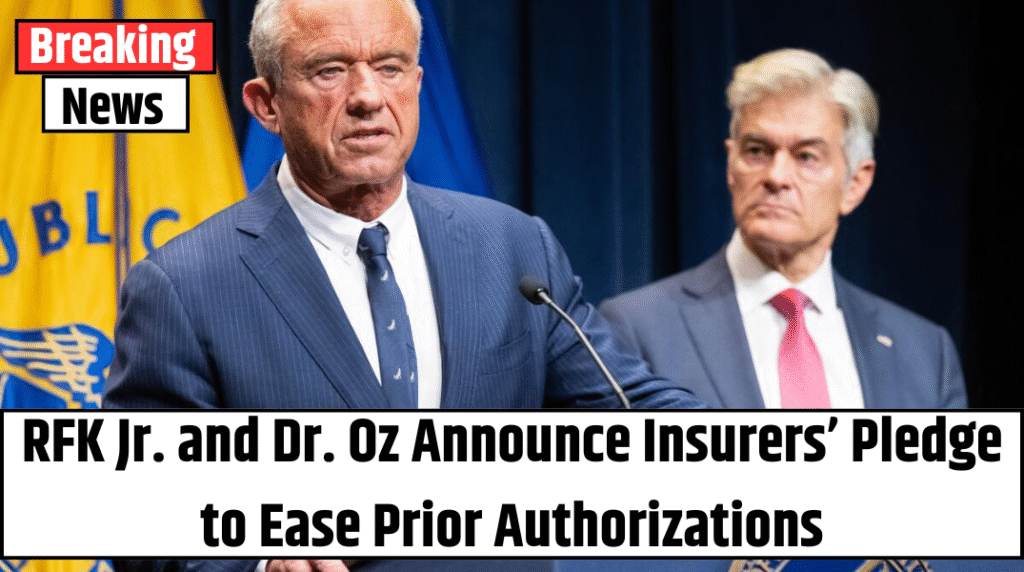If you’ve ever waited anxiously while your doctor’s recommended test or treatment sat in limbo, stuck in an insurer’s review process, you’re not alone. The prior authorization process — where insurers require doctors to submit extra paperwork to prove a procedure is “medically necessary” — has become a major bottleneck in the U.S. health care system.
Now, in a surprising twist, a coalition of the country’s top private health insurance companies says it’s ready to make things right. On Monday, health officials announced that by the end of this year, insurers will roll out major changes designed to streamline prior authorization and make it less painful for patients and providers alike.
The announcement, made jointly by the Department of Health and Human Services (HHS) and AHIP, the influential health insurance lobbying group, outlines six promises that insurers are pledging to implement:
The 6 Promises from Insurers:
-
Go Digital – Move to standardized electronic submissions instead of outdated fax machines and phone calls.
-
Cut the List – Reduce the number of services and medications that require prior authorization in the first place.
-
Keep the Green Light – Honor existing authorizations when a patient changes insurers mid-treatment.
-
Be Clear and Quick – Improve transparency around decisions and simplify appeals.
-
Decide Faster – Provide real-time approvals for most requests.
-
Use Medical Experts – Require that all clinical denials be reviewed by qualified medical professionals.
A Promising Pledge — or Just Another PR Move?
Health insurers have made similar vows before — with limited follow-through. That’s why some experts, including Miranda Yaver, a health policy professor at the University of Pittsburgh and author of Coverage Denied: How Health Insurers Drive Inequality in the United States, are skeptical.
Also Read – Justice Department Sends Threatening Letters to Medical Journals
“This is not the first time we’ve heard about industry-led reform,” Yaver said. “The real question is: Will this be different — or just another well-timed press release?”
In response to concerns, federal officials hinted they’re willing to take a firmer hand if progress stalls. HHS Secretary Robert F. Kennedy Jr. said the administration sees this as a practical, near-term opportunity to improve a deeply flawed system. And if insurers don’t live up to their commitments? New regulations are likely on the table.
A System Under Pressure — and in Peril
But the pressure to fix this isn’t just coming from doctors and patients. Dr. Mehmet Oz, the new head of the Centers for Medicare and Medicaid Services (CMS), raised eyebrows during the press conference with a blunt warning: The system may be reaching a breaking point.
“There’s real anger in the streets,” Oz said, referencing the shocking December 2024 killing of UnitedHealthcare CEO Brian Thompson. The suspect reportedly blamed delays and denials of care for the death of a family member.
“This is no longer something Americans are willing to tolerate quietly,” Oz added.
Reforms, but Also Roadblocks?
Even as insurers promise to reduce administrative burdens, some critics argue that the federal government is creating new ones. The Trump administration, backed by Republican lawmakers, is pushing forward with a controversial plan to require some Medicaid recipients to regularly prove they are working in order to keep their health coverage.
Yaver points to research showing such requirements don’t increase employment — they just reduce access to care.
“We might be solving one problem while creating another,” she said. “It’s not a simplification of the system. It’s just shifting the paperwork burden from one population to another.”
Also Read – FDA Approves Injectable Lenacapavir in Major Step for HIV Prevention
Will It Matter for Patients?
For now, doctors and patient advocates are cautiously optimistic. Some insurers have already started rolling out digital prior authorization tools that speed up decisions — in some cases, down to minutes instead of days.
But others worry that without enforcement, even a well-meaning pledge will falter.
“Patients don’t need promises,” said Dr. Alicia Grant, an oncologist in Ohio. “They need results — like not waiting three weeks for chemotherapy while someone reviews a PDF.”
What Comes Next?
The six-point reform plan is set to be in place by December 31, 2025. HHS says it will monitor implementation closely — and step in with new federal rules if necessary.
Until then, doctors may still be stuck hitting “send” on that fax machine.



